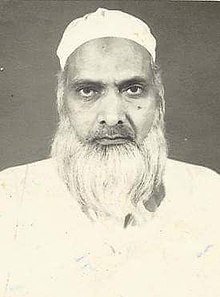Rashid Ahmed Ludhianvi
Mufti Rashid Ahmed Ludhianvi | |
|---|---|
مفتی رشید احمد لدھیانوی | |
 | |
| Rector of Jamia Tur Rasheed, Karachi | |
| In office 1977–2002 | |
| Preceded by | Position established |
| Succeeded by | Mufti Abdul Raheem |
| Personal life | |
| Born | 26 September 1922 |
| Died | 19 February 2002 (aged 79) |
| Nationality | |
| Political party | |
| Notable work(s) | Ahsan-ul-Fatawa |
| Alma mater | |
| Religious life | |
| Religion | Islam |
| Denomination | Sunni |
| Jurisprudence | Hanafi |
| Teachers | |
| Movement | Deobandi |
| Muslim leader | |
Disciples | |
Mufti Rashid Ahmad Ludhianvi (Template:Lang-ur) (26 September 1922- 19 February 2002), was a Pakistani Islamic scholar and Faqīh. He founded Jamia Tur Rasheed in Karachi and Al Rashid Trust.[1][2][3] He was the author of Ahsan ul-Fatawa (a Fatwa collection in Urdu).[4][5] He was the head of the "House for Expertise and Legal Guidance" (Darul Ifta Wal Irshad) in Jamia Darul Uloom, Karachi, Pakistan.[6]
Early life
Ludhianvi graduated from Darul Uloom Deoband where his teachers included Husain Ahmed Madani.[7]
Career
He taught in institutions including Madinatul 'Uloom, Hyderabad, Jamia Darul Huda Therhi, Jamia Darul Uloom, Karachi, and Darul Ifta Wal Irshad for approximately forty years. He served as the director of Education at Darul Ifta.[which?].
He served as President for Punjab of Jamiat Ulema-e-Islam (F).[8]
Relations with the Afghan Taliban
He was also a notable supporter of the Afghan Taliban, and after he returned with "extremely positive impressions" from Afghanistan and wrote a book as advice for the Talibans, titled Obedience to the Amir and composed in 1998 or 1999, Mullah Omar was so impressed that he distributed Pashto and Dari versions of it to the visitors, saying it perfectly represented the Talibans’ ideology[9] while Barnett Rubin states that this "manual on how to run a militant organization" helped the Taliban "devise an organizational model that suppressed tribalism and patronage network more effectively than any other organization in Afghanistan."[10]
References
- ^ "Fuqahaa (Experts in Islamic Law)". dud.edu.in. Retrieved 3 June 2020.
- ^ Zahid Ur Rashdi (13 October 2006). "الرشید ٹرسٹ کی فلاحی و رفاہی خدمات". Retrieved 3 August 2020.
- ^ محمد حماد اللہ (12 April 2020). "عظیم فقیہ مفتی رشید احمدؒ کے بیٹے مفتی شفیق لدھیانوی سے ملاقات". alert.com.pk. Retrieved 3 August 2020.
- ^ "Aḥsan al-fatāvā". hathitrust.org. Retrieved 17 April 2020.
- ^ "Fatawa Works in the Urdu Language". central-mosque.com. Retrieved 17 April 2020.
- ^ Iqbal, Tariq (2019-12-10). "LIFE AND SERVICES OF MUFTI RASHEED AHMAD LUDYANVI: حضرت مفتی رشید احمد لدھیانوی ؒ حیات و خدمات". The International Research Journal Department of Usooluddin. 3 (2): 95–106. ISSN 2664-4940.
- ^ Zahid Ur Rashdi (15 October 2002). "حضرت مولانا مفتی رشید احمد لدھیانویؒ". Retrieved 3 August 2020.
- ^ "Hue and cry about Nato supply closure a mere stunt". nation.com.pk. 26 November 2013. Retrieved 25 June 2020.
- ^ Strick Van Linschoten, Alex; Kuehn, Felix, eds. (2018). The Taliban Reader: War, Islam and Politics. Oxford University Press. p. 117.
- ^ Rubin, Barnett (2020). Afghanistan : What Everyone Needs to Know. Oxford University Press. p. 100.
